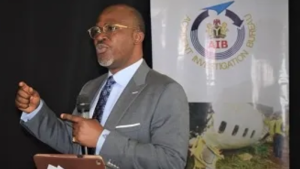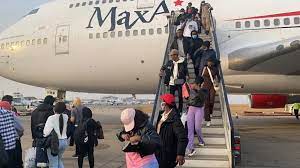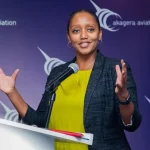
The preliminary report of the Nigerian Safety Investigation Bureau (NSIB) has indicted Max Air of overwriting the Cockpit Voice Recorder (CVR) of the serious incident, which occurred on May 7, 2023 on landing at the Nnamdi Azikiwe International Airport (NAIA), Abuja.
The report also accused the airline of feigning ignorance of the Nigeria Civil Aviation Authority’s (NCAA) All Operators Letter (AOL) (NCAA/FSG/AOL/19/03) in respect of continuous overwriting of CVR Information.
The report challenged NCAA to invoke the relevant sections of Nigeria Civil Aviation Regulations (Nig.CARs) 2015 in accordance with IS 1.3.3 Legal Enforcement Actions to non-compliant operators with the AOL (NCAA/FSG/AOL/19/03) on continuous overwriting of CVR information by airlines.
The Bureau explained that the serious accident took place in Abuja on May 7, 2023 on Boeing 737-400 aircraft with the registration number: 5N-MBD, which occurred on landing at Nnamdi Azikiwe International Airport, Abuja Nigeria on 7 May 2023 with 143 passengers onboard.
The preliminary report on the serious incident released by the Director-General, NSIB, Akin Olateru, in Abuja on Thursday, said that the aircraft departed Abuja for Yola as NGL1648 at 12:10pm and arrived Yola at 13:25pm same day.
The report said that the aircraft was on ground Yola for about 30 minutes before the turn around for Abuja.
The report also revealed that after takeoff, the landing gear was left extended for three minutes to allow cooling due to high temperature on ground Yola airport, adding that at 14:08pm, Nigerian Air Force personnel from the Air Force Hangar close to runway 35, reported to Yola Control Tower that an object “appearing like a tyre fell off from the departing NGL1649.”
This it said the control tower promptly informed the pilot as well as Kano Area Control (ACC) and Abuja tower.
Besides, the report stated that the flight purser (L1) and another cabin crew (L2) informed the pilot that a passenger at seat row 24 informed them about seeing a wheel fall off from the airplane, but the pilot responded that instruments and landing gear indications were normal.
“According to the pilot, the landing was normal, but after the airplane started decelerating, he noticed the port side wing was dropping lower than normal. He applied full aileron control to keep the wing from dropping until the lift decayed.
“Thrust reverser and minimal braking was used to stop the aircraft on the runway. At 14:57p.m, Abuja Air Traffic Control (ATC) informed NGL1649 ‘be advised, it appears you have smoke around your aircraft. We have called fire watch room,’ the Aerodrome Rescue and Fire Fighting Services (ARFF) and emergency services were alerted.
“The aircraft came to a stop between Link A5 and A6 about 2900m from the threshold of runway 22. The port wheel assembly was located by personnel of the Federal Airports Authority of Nigeria (FAAN) about 1000m from threshold of Runway 35 Yola airport on 08th May, 2023. The CVR recording was found to be overwritten.”
“Max Air Limited stated that they were unaware of the NCAA All Operators Letter (AOL) (NCAA/FSG/AOL/19/03) in respect of continuous overwriting of Cockpit Voice Recorder (CVR) Information,” the report stated.
NSIB’s report also revealed that that there was wrong tech-log entry of the serial number of the incident aircraft by the airline, while the quality control department did not supervise the maintenance action of the brake unit and wheel change on 5N-MBD conducted on May 5, 2023.
It also stressed that the crew did not take adequate measures to confirm the information about the missing wheel assembly, stressing that there the serious incident also led to severe fire damage on the Number 2 main wheel assembly of the aircraft.

It added that after the replacement of the wheel brake on May 5, 2023, an aircraft mechanic crosschecked the work performed by the engineer.
NSIB recommended that Max Air Quality Assurance should ensure maintenance activities are supervised and monitored in accordance with Maintenance Control Manual, while should conduct regular Safety Management System (SMS) assessments to evaluate the capability of Max Air limited to effectively manage safety.





